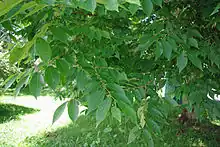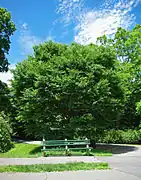| Zelkova schneideriana | |
|---|---|
 | |
| Foliage | |
 | |
| Detail of trunk at the Kunming Institute of Botany | |
| Scientific classification | |
| Kingdom: | Plantae |
| Clade: | Tracheophytes |
| Clade: | Angiosperms |
| Clade: | Eudicots |
| Clade: | Rosids |
| Order: | Rosales |
| Family: | Ulmaceae |
| Genus: | Zelkova |
| Species: | Z. schneideriana |
| Binomial name | |
| Zelkova schneideriana | |
Zelkova schneideriana, the Chinese zelkova (a name it shares with other members of its genus), is a species of flowering plant in the family Ulmaceae.[1] It is found in southeastern Tibet, and central and southern China, usually alongside streams.[2][3] A fast-growing deciduous tree with attractive exfoliating bark, it can reach 35 m (115 ft) tall and have a DBH of 80 cm (31 in).[3][4] Although highly resistant to honey fungus, it can still (rarely) be afflicted with Dutch elm disease.[4]
Uses
Its timber is high quality and resistant to decay.[3] Fiber can be extracted from the bark and used to make paper and rope.[4] It is used as a street tree in Wuhan, China.[5] When planted in urban settings in North Carolina, individuals showed signs of distress including crown dieback and cracking bark.[4]
 At the Arnold Arboretum
At the Arnold Arboretum%253B_Zelkova_tree_Wellcome_L0039434.jpg.webp) Ming dynasty depiction
Ming dynasty depiction
References
- ↑ "Zelkova schneideriana Chinese zelkova". The Royal Horticultural Society. 2022. Retrieved 5 December 2022.
- ↑ "Zelkova schneideriana Hand.-Mazz". Plants of the World Online. Royal Botanic Gardens, Kew. Retrieved 5 December 2022.
- 1 2 3 "大叶榉树 da ye ju shu". Flora of China. efloras.org. 2022. Retrieved 5 December 2022.
- 1 2 3 4 "Zelkova schneideriana Common Name(s): Chinese Zelkova, Schneider Zelkova". North Carolina Extension Gardener Plant Toolbox. N.C. Cooperative Extension. 2022. Retrieved 5 December 2022.
- ↑ Ossola, Alessandro; Hoeppner, Malin J.; Burley, Hugh M.; Gallagher, Rachael V.; Beaumont, Linda J.; Leishman, Michelle R. (2020). "The Global Urban Tree Inventory: A database of the diverse tree flora that inhabits the world's cities". Global Ecology and Biogeography. 29 (11): 1907–1914. doi:10.1111/geb.13169. S2CID 225429443.